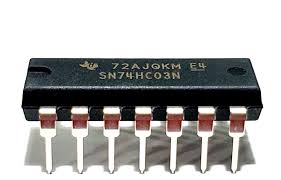SN74F08D
SN74F11N
SN74F174AD
This monolithic, positive-edge-triggered flip-flop utilizes TTL circuitry to implement D-type flip-flop logic with a
direct clear (CLR) input. Information at the data (D) inputs meeting the setup time requirements is transferred
to the outputs on the positive-going edge of the clock pulse. Clock triggering occurs at a particular voltage level
and is not directly related to the transition time of the positive-going pulse. When the clock (CLK) input is at either
the high or low level, the D-input signal has no effect at the output.
The SN74F174A is characterized for operation from 0?C to 70?C.
SN74F573DW
These 8-bit latches feature 3-state outputs
designed specifically for driving highly capacitive
or relatively low-impedance loads. They are
particularly suitable for implementing buffer
registers, I/O ports, bidirectional bus drivers, and
working registers.
The eight latches of the ?F573 are transparent
D-type latches. While the latch enable (LE) input
is high, the Q outputs follow the data (D) inputs.
When the latch enable is taken low, the Q outputs
are latched at the logic levels set up at the D
inputs.
SN74HC03N
SN74HC08D
SN74HC164N
These 8-bit shift registers feature AND-gated serial
1? Wide Operating Voltage Range of 2 V to 6 V
inputs and an asynchronous clear (CLR) input. The
? Outputs Can Drive Up to 10 LSTTL Loads gated serial (A and B) inputs permit complete control
? Low Power Consumption, 80-?A Maximum ICC over incoming data; a low at either input inhibits entry
? Typical tpd = 20 ns of the new data and resets the first flip-flop to the low
level at the next clock (CLK) pulse. A high-level input
? ?4-mA Output Drive at 5 V
enables the other input, which then determines the
? Low Input Current of 1-?A Maximum state of the first flip-flop. Data at the serial inputs can
? AND-Gated (Enable/Disable) Serial Inputs be changed while CLK is high or low, provided the
minimum set-up time requirements are met. Clocking ? Fully Buffered Clock and Serial Inputs
occurs on the low-to-high-level transition of CLK.
SN74HC20N
SN74HC259N
These 8-bit addressable latches are designed for
general-purpose storage applications in digital
systems. Specific uses include working registers,
serial-holding registers, and active-high decoders
or demultiplexers. They are multifunctional
devices capable of storing single-line data in eight
addressable latches and being a 1-of-8 decoder
or demultiplexer with active-high outputs
SN74HC640N
These octal bus transceivers are designed for asynchronous two-way communication between data buses.
These devices transmit data from the A bus to the B bus or from the B bus to the A bus, depending upon the
level at the direction-control (DIR) input. The output-enable (OE) input can be used to disable the device so the
buses are effectively isolated
SN74HCT244DW
? Operating Voltage Range of 4.5 V to 5.5 V
? High-Current Outputs Drive up to 15 LSTTL Loads
? Low Power Consumption: 80-?A Maximum ICC
? Typical tpd = 13 ns
? ?6-mA Output Drive at 5 V
? Low Input Current of 1 ?A Maximum
? Inputs Are TTL-Voltage Compatible
? 3-State Outputs Drive Bus Lines and Buffer
Memory Address Registers
SN74HCT244PWG4
These octal buffers and line drivers are designed
specifically to improve both the performance and
density of 3-state memory address drivers,
clockdrivers, and bus-oriented receivers and
transmitters. The SNx4HCT244 devices are
organized as two 4-bit buffers or drivers with separate
output-enable (OE) inputs. When OE is low, the
device passes noninverted data from the A inputs to
the Y outputs. When OE is high, the outputs are in
the high-impedance state



















